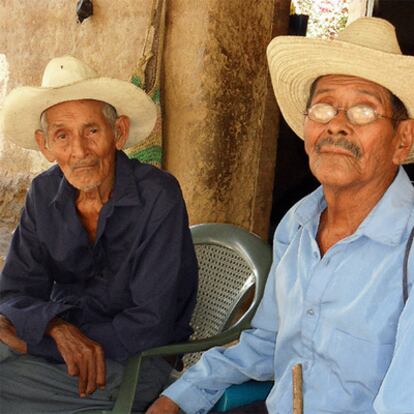The devil's experiment in Guatemala
Victims of US medical trials still suffer from syphilis more than 60 years later
In 1946, while the United States was prosecuting Nazi doctors for crimes against humanity at Nuremburg, its own physicians were involved in a secret program to infect Guatemalans with syphilis as part of tests to determine the efficacy of penicillin.
Among the 700 victims were Federico Ramos Meza and Manuel Gudiel, young conscripts doing their military service. After three months of basic training, they were sent to a US military unit based in the Central American country.
"The next day we were called to the hospital. They injected us. That was the beginning of the devil's experiment," says Ramos.
Between 1946 and 1948, a group of US medical personnel led by John Charles Cutler, who would later become assistant US Surgeon General, and under the direct command of the Health Department, infected 696 Guatemalans - men, women, and children - with a range of venereal diseases, among them syphilis and gonorrhea, without their consent or knowledge. Once the experiment ended, the matter was forgotten, and the victims were left to get on with their lives. Cutler died in 2003.
But last year, Professor Susan Reverby of Wellesley College in Massachusetts was carrying out research and came across Cutler's files. She immediately informed the media, which prompted an official apology from US President Barack Obama to his Guatemalan counterpart, Álvaro Colom. Since then, survivors and relatives of those infected have filed a class action suit against the US and Guatemalan governments, as well as the pharmaceutical company involved in the experiments, which has not been named.
"These people have been abandoned, and had to fight every day of their lives," says lawyer Hiram Sosa Casañeda, who, along with US law firm Henry Dell, has filed the lawsuit.
But the complaint comes too late for most of those involved who, like Ramos and Gudiel, are now in their eighties - or dead.
Ramos, who lives in the tiny community of Las Escaleras, in the east of the country, says that he was never told what was happening. "I would have to have been crazy to take part in such an experiment, but when you are a soldier you have to obey orders."
He says that the first signs of the disease appeared three months after he was injected. He was then taken to a clinic for tests every two weeks. "Despite the increasing pain we suffered, we were never relieved of our duties," says Gudiel. He says that after he was discharged, he was left to deal with the illness alone.
Ramos says that he still suffers from headaches, has had arthritis for many years, and urinates blood and pus.
"I was never treated for this," he says. His children and grandchildren have inherited the disease. His eldest daughter went blind in childhood, while Gudiel himself is almost blind, incontinent and has weeping sores on his legs. Unaware of his condition, he infected his wife.
Celso Ramírez Reyes, an army colleague who was also infected by US doctors, died in 1997. His son says that one of his sisters is blind, as is one of her children, while another suffers from epilepsy and is permanently tired. "We are poor and cannot pay the doctor, so we have to make do with home-made remedies," he says.
The victims' lawyers are confident that the US government will pay out compensation. But, as with efforts to reach a settlement over the experiments carried out by Cutler's team on poor African Americans in Tuskegee, Alabama, the process is long and complicated. The quickest route would be an out-of-court settlement, which would take around nine months.
The legal team says that it is suing the Guatemalan government for allowing the experiments and then for failing to inform the victims and abandoning them. "We don't have much faith in the justice system here, so we will be appealing to the Inter-American Human Rights Commission," says Castañeda. The unnamed pharmaceutical company has gone on to be a well-known and profitable firm, he says.
Among the younger victims is Marta Lidia Orellana, who was 10 years old and living in an orphanage when she was infected. "I was made to undress. They then forced my legs open and injected me in my vagina. It was very violent. I still have nightmares about it, and wake up sweating," she says.
She claims she was never told why she was subjected to forced experiments, and says that whenever she asked about what had happened to her she was told to keep quiet about it and was threatened. When she left the orphanage, aged 17, her condition was not monitored, but she was unable to get the health certificate required for any job in Guatemala. Later, when she became pregnant, she was injected with penicillin.
"May God forgive them for what they have done," she says.

Tu suscripción se está usando en otro dispositivo
¿Quieres añadir otro usuario a tu suscripción?
Si continúas leyendo en este dispositivo, no se podrá leer en el otro.
FlechaTu suscripción se está usando en otro dispositivo y solo puedes acceder a EL PAÍS desde un dispositivo a la vez.
Si quieres compartir tu cuenta, cambia tu suscripción a la modalidad Premium, así podrás añadir otro usuario. Cada uno accederá con su propia cuenta de email, lo que os permitirá personalizar vuestra experiencia en EL PAÍS.
¿Tienes una suscripción de empresa? Accede aquí para contratar más cuentas.
En el caso de no saber quién está usando tu cuenta, te recomendamos cambiar tu contraseña aquí.
Si decides continuar compartiendo tu cuenta, este mensaje se mostrará en tu dispositivo y en el de la otra persona que está usando tu cuenta de forma indefinida, afectando a tu experiencia de lectura. Puedes consultar aquí los términos y condiciones de la suscripción digital.








































